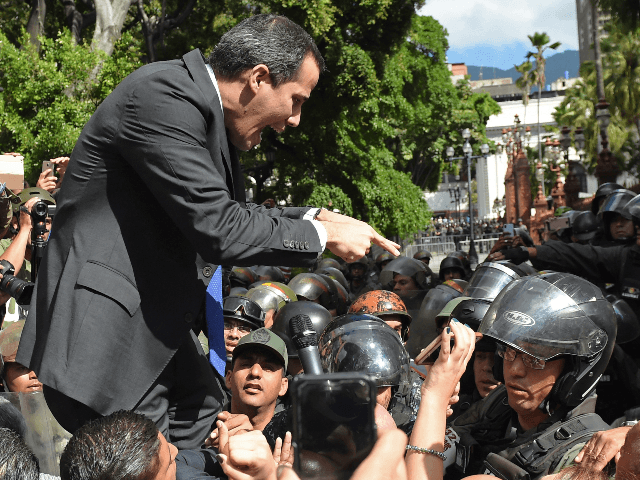Venezuelan President Juan Guaidó successfully entered the country’s National Assembly on Tuesday after an army of socialist riot police kept him out of his office on Sunday, beginning the first legislative session of the year amid a blackout.
Dozens of Bolivarian National Guard troops wearing helmets and carrying riot shields set up a check point before Guaidó arrived. On arrival, they forcibly prevented him from entering the building for around half an hour, with violent scuffles breaking out between his supporters and security forces.
As the chaos ensued outside, Luis Parra, a lawmaker recently implicated in a major corruption case involving the over-pricing of food imported by the regime, attempted to hold a legislative session led by members of the Socialist Party of Venezuela (PSUV). Parra claims to be part of the opposition against socialist dictator Nicolás Maduro.
Guaidó became the legal president of Venezuela in January 2019 through a constitutional provision that allows the National Assembly, the federal legislature, to appoint an interim president if the term of the current president expires and he or she refuses to leave, causing a “rupture in the democratic order.” Maduro’s legal term ended last year, but he claimed power after “winning” a rigged election in May 2018 in which he banned all non-socialist and communist candidates. The election logged the lowest turnout in history.
The National Assembly chose Guaidó as its president because he was then the president of the National Assembly, the only branch of government featuring public servants chosen in free and fair elections. He kept both titles until this weekend when his term as president of the assembly expired. On Sunday, lawmakers attempted to enter the legislative chambers to reelect Guaidó the president of the assembly when Maduro’s police and National Guard soldiers blocked them, violently pushing them away. Guaidó himself attempted to jump the fence at the doors of the Assembly, but failed, vowing to return on Tuesday. Parra claimed to swear himself in as the new president in the building while the melee continued outside.
The situation was different on Tuesday, when the lawmakers successfully pushed through the wall of National Guard troops to enter their own offices.
After Guaidó finally gained access to the building, he and around 100 fellow lawmakers took control of the chamber as Parra and his cohort had already left. They proceeded to sing the national anthem before electricity was cut out in the chamber, forcing deputies to use the torches on their mobile phones to see through the darkness.
Later on, they voted to recognize Guaidó’s re-election as head of the National Assembly for the year 2020 and rejected Parra’s attempt at claiming the role. Lawmakers locked out on Sunday had attempted to vote for Guaidó outside in an impromptu session while Parra hijacked the lawmaking floor.
“The people are the ones who decide who enters the Parliament, not the military,” Guaidó declared during the session.
Writing on Twitter after the mayhem, Guaidó maintained that he and his colleagues will continue to “stand firm” against the regime’s repressive apparatus.
“We entered the [legislative rotunda],” he wrote. “There are still deputies being restrained and assaulted outside by the repressive forces of the dictatorship. The dictatorship and its accomplices made a fool of themselves and ran away.”
“In the union of Venezuelans is lies the strength to defeat this dictatorship,” he continued. “We enter the chamber to fulfill our duty, not with violence, but with the force of reason and the majority. United, organized and strong, it is possible.”
The 36-year-old lawmaker, who recently left the socialist Popular Will party to sit as an independent, has largely failed to use his presidential powers because Maduro retains the loyalty of the military, which he regularly uses to intimidate, injure, and kill supporters of the opposition.
Following his appointment, Guaidó energized the large majority of Venezuelans who oppose Maduro with the belief that the regime could be overthrown by winning over the support of the country’s military. Despite gaining support from the United States and most the Western democratic world, Guaidó failed to persuade the military high brass to recognize his position. He later resorted to unsuccessful “negotiations” with the regime, a move that lost him support among many of his followers.
Follow Ben Kew on Facebook, on Twitter at @ben_kew, or email him at bkew@breitbart.com.

COMMENTS
Please let us know if you're having issues with commenting.